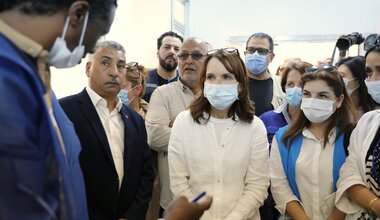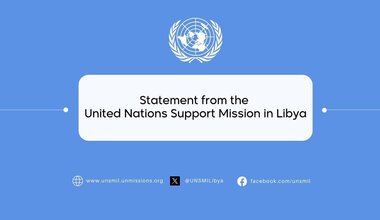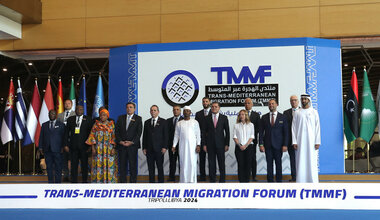Joint Communique by League of Arab States, African Union and United Nations (UNSMIL)
1. The League of Arab States, the African Union, and the United Nations held a trilateral meeting at the headquarters of the League of Arab States on 25 October 2016 to discuss the situation in Libya and the means to further cooperation between the three organizations in order to advance the political process and assist Libya in its democratic transition.
2. The meeting was held between Mr. Ahmed Aboul Gheit, the Secretary General of the League of Arab States, former President Jakaya Kikwete, the AU High Representative for Libya, and Mr. Martin Kobler, the Special Representative of the Secretary General and head of the UN Support Mission in Libya.
3. The parties reaffirmed their commitment to the sovereignty, independence, territorial integrity and national unity of Libya and the promotion of a Libyan-led peaceful resolution of the situation to enable Libya to complete its democratic transition. In this regard, the parties reiterated their rejection of any foreign military intervention in Libya.
4. The parties underscored the need for a coordinated and complementary international and regional approach to assist Libya in addressing the political, security and economic challenges it faces. They welcomed, in this context, the renewed determination of LAS to enhance its role in support of the political process including through the appointment of a Special Representative of the Secretary General for Libya.
5. As recommended by the ninth ministerial meeting of the neighboring states of Libya, held in Niamey on 19 October 2016, the parties resolved to form a Troika between the League of Arab States, the United Nations and the African Union for the purpose of enhancing cooperation and coordination between the three organizations to encourage national reconciliation, advance political dialogue, and facilitate the implementation of the Libyan Political Agreement (LPA) signed in Skhirat.
6. The parties agreed to conduct joint missions by the envoys of the three organizations to Libya in order to encourage key Libyan parties and stakeholders to discuss, in good faith, the core issues that could further advance the ongoing political process.
7. The parties condemned the recent acts of violence in Tripoli and the attempted seizure of the headquarters of the High Council of State. They stressed that these inadmissible actions hinder the political process and impede Libya’s democratic transition. They called for the swift de-escalation of the situation and consolidation of security and rule of law in Tripoli in order to enable the Presidency Council (PC) to exercise its responsibilities and functions under the LPA.
8. The parties expressed their support for the PC and urged it to continue to assume its responsibilities, in an inclusive manner, as mandated by the LPA, and to present a revised cabinet of the Government of National Accord. They also expressed their support for the House of Representatives, as the legislative authority of the State, and urged it to continue to fulfill its responsibilities towards the LPA.
9. The parties reiterated the need for a constructive and inclusive political dialogue in order to overcome the obstacles facing the implementation of the LPA. They also stressed the importance of mutual confidence building measures among all parties in order to avoid any further escalation of the situation on the ground, as well as the need to promote initiatives to achieve national reconciliation.
10. The parties emphasized the importance of a cohesive and professional Libyan military and security force operating under a unified chain of command as mandated by the LPA, and stressed the overarching importance of addressing this objective as a priority issue within an inclusive political dialogue among the parties concerned.
11. The parties expressed their support for the ongoing efforts and military operations against terrorist groups in Sirte, Benghazi and other areas, and emphasized the need for the provision of early stabilization and recovery assistance for the rehabilitation of those areas secured from terrorist control.
12. The parties welcomed all efforts aimed at restoring Libya’s oil production, resuming its exports and increasing its capacity. They stressed the need for a unified and capable National Oil Corporation that will be able to exercise its responsibilities over all oil facilities throughout the country; they also emphasized that all revenues generated from oil exports should be channeled through the appropriate legitimate mechanisms and stressed the importance of a unified and capable Central Bank of Libya to oversee these funds. They further underscored that all Libyan natural resources should be employed in an equitable and transparent manner for the overall benefit of Libya and all its people.
13. To this end, the parties welcomed efforts by the PC to improve its relationship with the Central Bank of Libya and stated their willingness to provide the PC, upon its request, with technical support to assist it in the field of public financing and expenditures.
14. The parties expressed their determination to examine how best they can collectively mobilize and coordinate all forms of international support and assistance for Libya including through the convening, at an appropriate time and when conditions permit, of an international conference as envisioned in Article 58 of the LPA.
15. The League of Arab States, the African Union and the United Nations agreed to continue their active coordination including through the convening of future regular trilateral meetings.
Cairo, 25 October 2016
 United Nations Peacekeeping
United Nations Peacekeeping UN
UN






